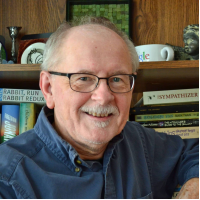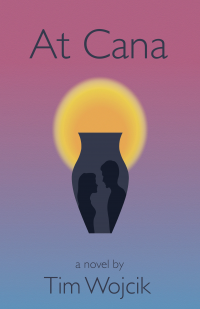Genre:
Historical Fiction Christian Fiction General Nonfiction Christian Nonfiction- Country: United States
- Books: 1
- Profession: Media Specialist
- Member Since: Dec 2021
- Profile Views: 14,012
- Followers: 68
Becoming a bookseller gave me the opportunity to enjoy the many facets of books – be it the cover of the book, the story, the pictures, meeting customer demand, the publishers reps, or the satisfaction of building a collection. It was an era of the family bookstore, and the Little Professor Book Center in Trenton, Michigan needed a manager. For the next seven years I lived and breathed the business and pleasure of book selling. I worked in or managed bookstores in Michigan (Dearborn, Trenton, Traverse City, downtown and Midtown Detroit) and in Fort Lauderdale, Florida.
At Cana, my first novel, developed over many years of mornings or afternoons grabbed during summer and Christmas vacations and school holidays. Mixing sacred and secular characters offers challenges for the writer who wishes to stay on good terms with his faith-based community. Other writing projects offer topics as wide ranging as a 21st Century horizon! And, I continue to keep in touch with my librarian community.
Tim Wojcik's Books
Stay in the loop on books by Tim Wojcik. See upcoming and best-selling books by the author here. You'll also find the deals on books by Tim Wojcik.
** Please note that the information or price displayed here may not be the updated. Make sure to double-check the latest book price before buying books.
** Also, there might be other books by Tim Wojcik not listed on AllAuthor.
| Book |
|---|
Tim Wojcik Interview On 20, May 2022
 "Tim Wojcik is a bookseller, corporate administrator, librarian, and media specialist. For four years, he managed the Librarians/Library Science guide site. Working in education gave him some time to write. He started writing At Cana during his high school librarian career. Tim developed his first novel over many years, finding time during his summer and Christmas vacations and school holidays. He continues to keep in touch with his librarian community. He enjoys nature, family photography, and traveling."
"Tim Wojcik is a bookseller, corporate administrator, librarian, and media specialist. For four years, he managed the Librarians/Library Science guide site. Working in education gave him some time to write. He started writing At Cana during his high school librarian career. Tim developed his first novel over many years, finding time during his summer and Christmas vacations and school holidays. He continues to keep in touch with his librarian community. He enjoys nature, family photography, and traveling."
Some of my favorite childhood memories.
There was a mature cherry tree in our backyard at home. The cherries would ripen in June, and I would be able to pick a few here or there from the lower branches. On a Saturday during that month, when dad was off from work, the kids would help him pick the tree. Of course we could treat ourselves to the cherries and save the ones nicked by birds till later.
I'd help myself to the pot of sweet tea my mom made and left on top for us to enjoy.
The warmth of the radiator after coming in from the winter cold.
Going to a baseball game at Tiger Stadium in Detroit.
My first photo camera. Campouts with the Boy Scouts.
What are some things that vastly influenced your interest in books and writing?There were a couple of physical factors. One, I wasn't the biggest boy on the block. Two, living in a cool climate left plenty of time indoors – to read.
My parents purchased the Britannica Junior Encyclopedia. I explored the set, learning about different places and different people. Being able to explore a bit of the world through the written word and some small photos: that informed me of the value of books.
As a bookseller in my early 20s, the notion of the great American novel fascinated me. I guess I thought I could, one day, write one.
Before electronic texts, a book was this physical, tangible entity. Something enduring. Still is.
And, to be honest, this book object also had the author’s name on it.
Do you remember the first piece you ever wrote? What was it about?I was blessed, or cursed with being the valedictorian of my eighth grade class in parochial school. So, I had to come up with a valedictorian speech. Everybody else in my class was enjoying their last week of school, while I was fretting and dreading this performance. I recall my attempt at the speech being completely rewritten by grown-ups.
What are some writing tips you've borrowed from your favorite authors?On the advice side, Rule # 17 from Strunk and White’s Elements of Style – “Omit needless words.” Comes in handy on the re-write.
I took courage from Tom Wolfe’s exuberant writing style. Wolfe gave the words a verve, an energy along with the meaning. In his early writings he bent the rules of punctuation. I liked that. And, I suppose covering subjects such as Ken Kesey and the Merry Pranksters offered Wolfe a license not included in covering the social register or the obits.
There’s a useful little line I first noticed in Roddy Doyle’s writing. After Doyle’s description of some elaborate or overwrought emotional outburst, he sketches a simple response to it. “He said nothing.” The character’s silent response can speak volumes.
What's one lesson you have learned while managing bookstores in Michigan?Meet demand as best you can – don’t go out-of-stock on a popular item if you can help it. People like what they like. It doesn’t matter how I value the subject.
When it comes to historical fiction, how do you write to ensure a thoroughly convincing scene?I chose to blend 21st Century sensibilities with my characters from 30 CE. I think blending the behaviors from both eras was worth the risk. A reader, I believe, will respond to a form of speech they recognize. For example, if the belt is too tight, my male character doesn’t say to his fellows: “Oh, that my leather strap cease its chafe!” He’ll say something like “Hold up! I need to loosen my belt.”
Having said that, in At Cana I chose to include some words from versions of Greek, Hebrew and Latin. The reader sees and sounds out a word like khamor, then glances at the bottom of the page to see it is Hebrew for donkey. A bit of color for the place of the story --
Getting the details of an historical scene sufficiently correct requires research.
Why did At Cana, your first novel, take so long to develop?I started writing At Cana during my high school librarian career. I had the gift of time to write during summer vacations and other school breaks. For several years, At Cana was more of a hobby than a goal to complete. As my library responsibilities ended I had more time for writing. Also, an insurance policy unexpectedly matured which offered the funding for the publishing expenses. This funding pushed the project across the finish line.
What do you read as inspirations for your writings?One source of inspiration and example is historical fiction from the 30CE Palestine era. There’s a lot of it. Also, I’ll look for non-fiction on the history of the 30 CE era. A title I’m looking through these days explores the “social structures and social conflicts” of the 30 CE era in Palestine – the Roman Empire, the Temple hierarchy, and the people.
Who is your target audience? What are some things you wish your readers would take away from your books?My target audience is a challenge. Most readers of historical fiction of the 30 CE Palestine era, I think, are women who prefer a traditional writing style. With my use of 21st-century sensibilities in my characters, some of these readers may be unused to the style. In general, my target for At Cana is an fiction audience familiar with the Christian story.
With contemporary sensibilities in the novel, I'm hoping the reader recognizes herself or himself in characters from 2000 years ago. They ate and drank, we're happy or grumpy, and teased or bedeviled each other just as we do.
What are some hard lessons you've learnt about the book industry as an author? Is there a dark side to this industry that not many people discuss?First time fiction writers have a tremendous challenge creating demand for their product. With so many terrific authors already in the market, how does one fit in and get recognized? It is hoped family and friends would take note of the book and chat it up a bit. Everyone has a stack of books on their waiting-to-be read table. Convincing folks to set aside their reading choices for your book takes much persistence. I’ve used this hook – They’re short chapters! Read one a day.
It seems to me publishers would use opportunities such as local book fairs to promote the books they publish. They would sell more books. But there is a marketing “package” for that. Promotion from the self publishing companies comes with a price tag and is reserved for those authors willing to pay extra for the service.
How long does it usually take you to finish writing a chapter?It varies. Chapters which move the plot along need more pages/more writing. With several characters already introduced, an interior chapter can take time to simply get the chronology correct. On the other hand, I wrote a short chapter for At Cana after the novel was essentially complete. It was just over two pages with three characters and dialogue around a dining table. It flowed out in about one hour.
Audio book vs e-book vs printed book, which one do you prefer and why?Fiction is more entertaining via audio. The reader of the audio gives a performance for the listener. Fast paced novels pair well with audio, and they’re great for long distance driving trips.
A book used more for reference, I find is more helpful in print. Print is still a winner for picture books – even if many kids are already hooked on their “device”. A printed book has the added value of being tangible – no electricity required to pick it up and get a feel for it.
If you want to load up on a bunch of books without loading yourself down, e-books can’t be beat.
Do you have any dreams or aspirations that you have yet to accomplish? If so, what are they?A best seller would be nice. Travel. The Camino de Santiago sounds appealing. There’s that line from the Billy Joel song “Vienna waits for you”.
How many plot ideas are just waiting to be written? Can you tell us about one?At Cana is set in a place. There are a couple more plot lines of places from 30 CE I’d like to explore. It could be Capernaum, or Nazareth, or Bethany. Jerusalem was destination #1 at that time.
When did you first join AllAuthor and did you join as a free or pro-member first? What are your thoughts on this website?I joined AllAuthor as a pro-member near the end of 2021. It was recommended by a fellow author from my writers group. At that same time I became involved is other promotion avenues for At Cana. It took a little while for me to explore the features of AllAuthor.
Besides the promotional benefits of AllAuthor, I enjoy browsing through the authors and their books to find a kindred spirit or a timely topic. The mockup banner is always fun. The Twitter prompts are a good reminder for me to get out another re-phrasing of the line Read My Book!
Ask Tim Wojcik a Question
Have brimming questions to ask author Tim Wojcik? Ask whatever you like, but keep it appropriate.
** Please note that unanswered questions will not appear on the page. Refrain from posting promotional messages.


